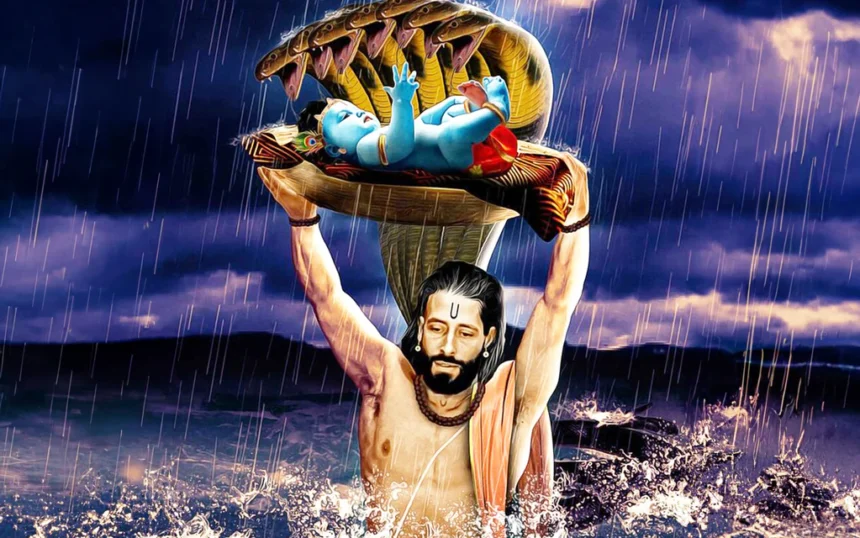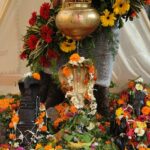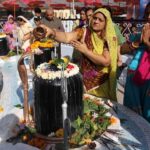Introduction
Krishna Janmashtami, celebrated across India and many parts of the world, marks the divine birth of Lord Krishna, the eighth incarnation of Lord Vishnu. This sacred festival falls on the eighth day (Ashtami) of the Krishna Paksha in the Bhadrapada month (August–September). The story behind Krishna’s birth is deeply spiritual, dramatic, and filled with miracles — a tale that continues to inspire millions.
Let us explore the beautiful and divine story of Krishna’s birth and understand why Janmashtami is celebrated with such devotion.
The Birth of Lord Krishna: A Divine Tale
Long ago, during the Dwapar Yuga, the city of Mathura was ruled by a powerful but wicked king named Kansa. Though feared by all, he was deeply attached to his sister Devaki, whom he married off to the noble prince Vasudeva.
As the couple was departing after their wedding, a divine voice (akashvani) echoed from the sky:
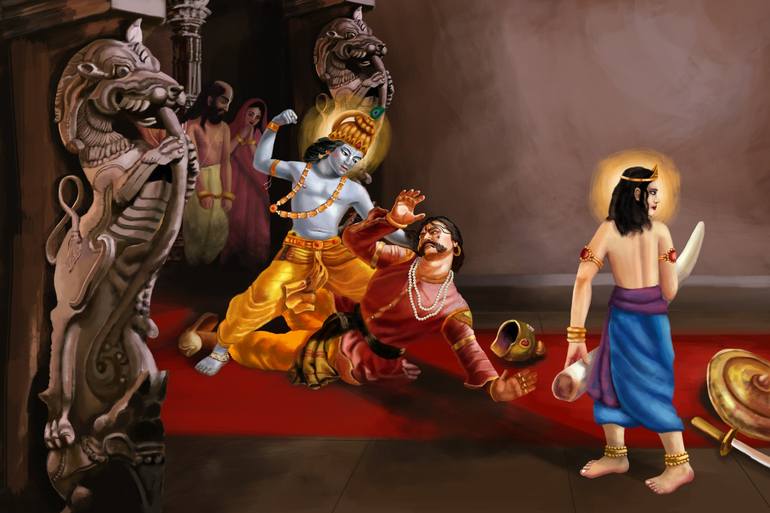
“O Kansa, the eighth child born to Devaki will be the cause of your death!”
Terrified and enraged, Kansa drew his sword to kill Devaki instantly. But Vasudeva intervened and pleaded for her life, promising to surrender every child born to them. Kansa agreed and immediately imprisoned Devaki and Vasudeva in a heavily guarded dungeon to keep them under his watch.
The Tragic Fate of the First Seven Children
Over time, Devaki gave birth to six children. True to his promise, Vasudeva handed each newborn to Kansa, who mercilessly killed them. When the seventh child was conceived, a divine miracle occurred. By the command of Lord Vishnu, Yogmaya transferred the unborn child to the womb of Rohini, Vasudeva’s other wife who lived in Gokul.
That child was Balram, the elder brother of Krishna. People in the palace believed Devaki had a miscarriage.
The Divine Birth of Krishna

Finally, on the eighth night of the waning moon, Devaki gave birth to Lord Krishna in the prison cell. The moment Krishna was born, the entire environment transformed:
-
-
The prison gates opened automatically
-
The guards fell into a deep sleep
-
Vasudeva’s chains loosened and fell off
-
- A divine light illuminated the dark dungeonA celestial voice commanded Vasudeva to take the newborn to Gokul, to the house of Nanda Baba and Yashoda, and exchange him with their newborn daughter.
Krishna’s Journey to Gokul
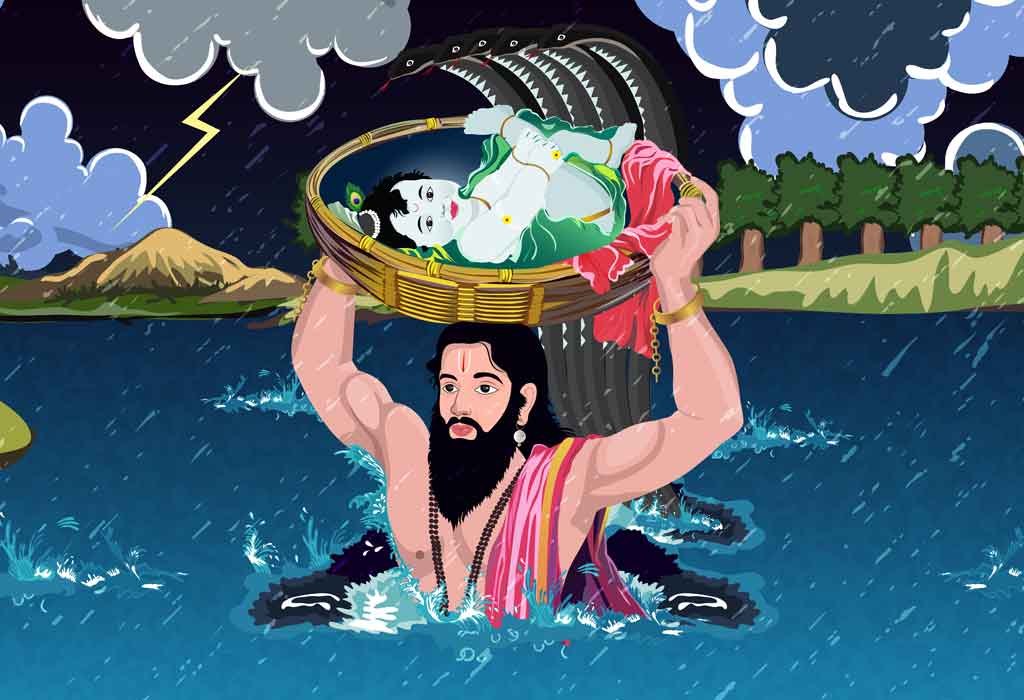
Vasudeva placed the infant Krishna in a basket and began his journey on a stormy night. The Yamuna River, though flooded, parted miraculously to allow him passage. As the rain poured heavily, Sheshnag, the divine serpent, appeared and protected baby Krishna with his giant hood.
Reaching Gokul safely, Vasudeva exchanged Krishna with the baby girl born to Yashoda, and silently returned to the prison with her.
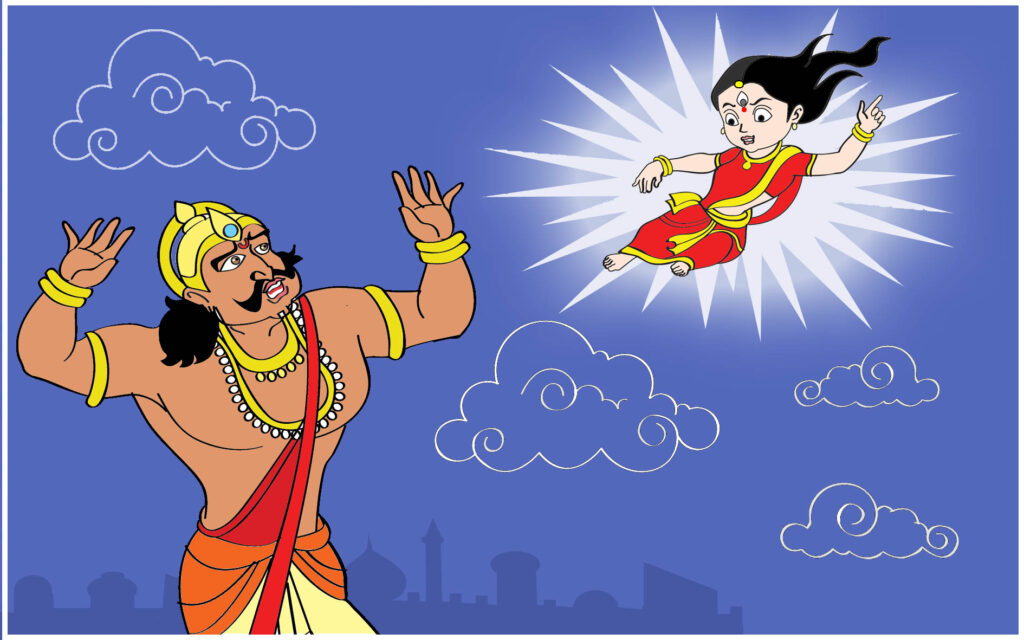
Kansa’s Failed Attempt
At dawn, Kansa rushed into the prison to kill the newborn. As he tried to dash her against a stone, the baby girl slipped from his hands, rose into the sky, and transformed into Goddess Yogmaya. She warned:
“The one destined to destroy you has already been born and is safe.”
Krishna’s Childhood and Divine Purpose
Krishna grew up in Gokul, lovingly raised by Yashoda and Nanda. From a young age, he displayed miraculous powers and divine charm. His playful pranks, love for butter, and enchanting flute won the hearts of all.
As he grew, he:
-
Lifted the Govardhan Hill to protect the villagers from torrential rains
-
Defeated demons sent by Kansa
-
Taught lessons of love, truth, and duty
Eventually, Krishna returned to Mathura, defeated and killed Kansa, and freed his real parents from imprisonment.
Later, during the epic Mahabharata, Krishna served as Arjuna’s charioteer and delivered the Bhagavad Gita — a timeless guide on life, duty, and devotion.
Why Do We Celebrate Janmashtami?
Krishna Janmashtami is not just the celebration of a divine birth — it represents:
-
The triumph of good over evil
-
The power of faith and righteousness (dharma)
-
The idea that whenever darkness rises, divine intervention restores balance
It reminds us to live with love, humility, and devotion.
More Read
How is Janmashtami Celebrated?
Across India and the world, devotees celebrate this auspicious day with great enthusiasm:
- Fasting and midnight celebrations (Krishna was born at midnight)
- Re-enactments of Krishna’s birth and childhood leelas
- Singing bhajans and chanting mantras
- Decorating temples and homes with flowers, lights, and jhankis
- In places like Mathura, Vrindavan, Barsana, and Gokul, celebrations are especially grand and spiritually uplifting.


